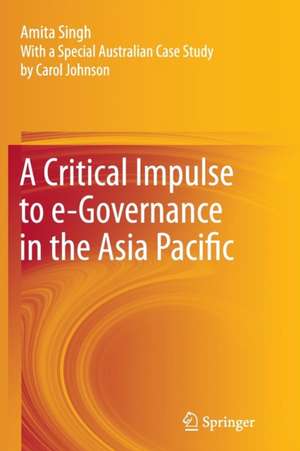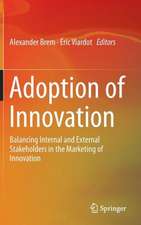A Critical Impulse to e-Governance in the Asia Pacific
Autor AMITA SINGHen Limba Engleză Paperback – 27 aug 2016
| Toate formatele și edițiile | Preț | Express |
|---|---|---|
| Paperback (1) | 568.44 lei 38-44 zile | |
| Springer India – 27 aug 2016 | 568.44 lei 38-44 zile | |
| Hardback (1) | 556.50 lei 38-44 zile | |
| Springer India – 10 dec 2013 | 556.50 lei 38-44 zile |
Preț: 568.44 lei
Preț vechi: 738.23 lei
-23% Nou
Puncte Express: 853
Preț estimativ în valută:
108.79€ • 113.15$ • 89.81£
108.79€ • 113.15$ • 89.81£
Carte tipărită la comandă
Livrare economică 10-16 aprilie
Preluare comenzi: 021 569.72.76
Specificații
ISBN-13: 9788132228462
ISBN-10: 8132228464
Pagini: 187
Ilustrații: XV, 187 p. 9 illus. in color.
Dimensiuni: 155 x 235 x 11 mm
Greutate: 0.29 kg
Ediția:Softcover reprint of the original 1st ed. 2013
Editura: Springer India
Colecția Springer
Locul publicării:New Delhi, India
ISBN-10: 8132228464
Pagini: 187
Ilustrații: XV, 187 p. 9 illus. in color.
Dimensiuni: 155 x 235 x 11 mm
Greutate: 0.29 kg
Ediția:Softcover reprint of the original 1st ed. 2013
Editura: Springer India
Colecția Springer
Locul publicării:New Delhi, India
Cuprins
Chapter 1: From Governance to e-Governance.- Chapter 2: Epistemology and Theoretical Explorations of e-Governance.- Chapter 3: Developmental Aspirations and Networked Readiness.- Chapter 4: Towards sustainability of e-governance.- Chapter 5: Information Technology and the Role of Government in Australia: Political Ideology and Discourse in the ‘Asian Century’.- Chapter 6: Privacy, Control and the Law.
Recenzii
“Everyone who wants to think clearly and productively about how information and communication technology may transform governance, citizenship, and political culture should read this masterful, comprehensive, yet succinct analysis of the big questions and issues involved. Professor Singh cannot tame the Internet but she can and does make the potential impacts of e-governance on democratization, individual privacy, freedom of speech, and law highly intelligible.”
David H. Rosenbloom, Distinguished Professor, School of Public Affairs, American University, Washington DC, USA
“This wide ranging analysis uses concepts from philosophy, sociology, psychology and political economy to help understand how successful adoption of information and communication technology by Asian governments depends on productive coordination among government agencies, business, and civil society. It also requires a foundation of effective institutions, communication infrastructure, inter-operability across platforms, technical skills, and wide accessibility for the potential benefits to be realized.”
Clay Wescott, Director, Asia Pacific Governance Institute, Washington DC, USA
“The book emphasizes the dynamic nature of governance and the realities of its impact on development. It touches the core principles of political economy. Governments looking for answers will able to find them in this book. The chapter on the epistemological and the theoretical discourse highlights some of the fundamental flaws of conceptualising e-governance in isolation from ICT. Whilst the Australian case study highlights the theoretical debate on governance and ICT, it also provides an example of how other actors in the economy can pose a challenge to government efforts.”
Datuk Dr. Norma Mansor, Director, Social Security Research Centre, University of Malaya, Kuala Lumpur, Malaysia
David H. Rosenbloom, Distinguished Professor, School of Public Affairs, American University, Washington DC, USA
“This wide ranging analysis uses concepts from philosophy, sociology, psychology and political economy to help understand how successful adoption of information and communication technology by Asian governments depends on productive coordination among government agencies, business, and civil society. It also requires a foundation of effective institutions, communication infrastructure, inter-operability across platforms, technical skills, and wide accessibility for the potential benefits to be realized.”
Clay Wescott, Director, Asia Pacific Governance Institute, Washington DC, USA
“The book emphasizes the dynamic nature of governance and the realities of its impact on development. It touches the core principles of political economy. Governments looking for answers will able to find them in this book. The chapter on the epistemological and the theoretical discourse highlights some of the fundamental flaws of conceptualising e-governance in isolation from ICT. Whilst the Australian case study highlights the theoretical debate on governance and ICT, it also provides an example of how other actors in the economy can pose a challenge to government efforts.”
Datuk Dr. Norma Mansor, Director, Social Security Research Centre, University of Malaya, Kuala Lumpur, Malaysia
Notă biografică
Amita Singh is a Professor of Law and Governance at the Centre for the Study of Law and Governance at Jawaharlal Nehru University. She is also the Secretary General of NAPSIPAG (Network of Asia Pacific Schools and Institutes of Public Administration and Governance), a governance research network for the Asia Pacific region. She has written extensively on administrative reforms and the conservation of ecology and ecosystems. Her Australia India Council Fellowship in 2006 and subsequent association with the Government Innovators Network at the Ash Institute of Democratic Governance (Harvard University) have brought her close to technology issues in government reforms. Currently she is involved in studying the nature of partnerships which govern Information and Communication Technology in Asia Pacific countries.
Textul de pe ultima copertă
This book presents a comparative study of the vision, ability and dynamism on the part of governments in selected Asian Pacific countries as they engage in the distribution of e-governance. Consequently, it creates a platform for mutual learning and offers a dispassionate evaluation of mega e-projects. It is an interdisciplinary study of information and communication technology within mainstream social science research and attempts to bridge the gap in empirical research between the nature of technology and the manner in which it is governed. The analysis shows that hegemonic and panoptic structures of surveillance and control may derail efforts to establish sustainable e-governance, while a liberal futuristic framework with open socio-technology networks on Big Data analytics, IPv6 and Cloud Computing may strengthen the trend towards democratizing institutions. Further, the book highlights the extraordinary energy being generated in the emerging new world through their use of the internet and suggests how governments could translate this into a new wealth of economic opportunities, social inclusion and equitable development, in addition to achieving the MDGs (Millenium Development Goals). Lastly, it emphasizes the importance of a visionary approach, which, wherever present, has been able to sustain e-governance by meaningfully linking the micro to the macro and heritage to the horizon.
Caracteristici
Presents a comparative study of governments’ vision, ability and dynamism with regard to adopting e-governance in Asia Pacific countries This interdisciplinary study of information and communications technology (ICT) within mainstream social science research provides readers with a more holistic understanding of technology issues Highlights the extraordinary energy being generated in the emerging new world through their newfound access to the Internet and suggests how governments could translate this into economic opportunities, social inclusion and equitable development













